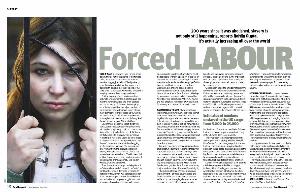Take a walk in London’s Hyde Park on a Sunday and you’ll notice that some of the families taking an afternoon stroll will have an extra member lagging just behind. She’ll probably be of Filipino or south Asian background and it’s perfectly possible that she’ll be one of the lucky ones – a domestic worker on a proper visa enjoying reasonable working conditions.

One of these is Naomi, a street-child from Sierra Leone. She was one of the people who told me her story for my book on contemporary slavery. Her mother had died in childbirth and her father, too ill to run away, was burnt alive in their hut in rural Sierra Leone by rebel forces during the civil war. At the age of eight or nine, she can’t remember, she ended up begging on the streets of Freetown. She was taken in by a woman from the local Lebanese community, who appeared kind and offered her somewhere to stay and work. The kindness did not last. Soon she was being worked relentlessly for no pay, fed only occasionally, and hidden whenever visitors came over.
Then the woman arranged to bring Naomi to Britain, where she left her with her “sister” to continue her unpaid domestic servitude. It’s not clear if this woman was a professional trafficker or merely opportunistic. Most likely she was an “informal” people-smuggler, not part of a criminal gang but someone with family or community links through which she could trade people. Without a passport or papers of any kind, and unable to speak English, Naomi was utterly dependent on her “employer”, who beat her and kept her locked in the house. Eventually, sick of being abused, beaten, starved and imprisoned, she found an open door and made a run for it. She was picked up by a man who promised to help. Instead, he forced her into prostitution. When she found she was pregnant Naomi ran away again and, fortunately, was taken to Southwark council.
Naomi doesn’t know where she’d been imprisoned, or by whom. She therefore cannot seek justice. Now that her status has been legalised through social services she has access to healthcare, education, housing and the support of a social worker, all denied her while she was undocumented. But when she turns 18 this December, Naomi will have to reapply for leave to remain. There is no guarantee that she will succeed. She and her baby son could easily end up on the streets of Freetown in that vicious noose of history which dangles over those who have few options.
In a year resounding with commemorations of abolition, it’s painful to recognise that slavery has not disappeared. On the contrary, it is on the increase across the world and not just in developing countries but right here in Europe. Though modern slavery does not feature the leg-irons and public auctions which are the familiar iconography of the Atlantic slave trade, it is just as destructive of human life and dignity.
The defining feature of modern slavery is imprisonment – physical, psychological and financial – often sustained through violence. While no human being legally owns another, men, women and children continue to be bought and sold. While some are entrapped physically, others are bound by the imposition of huge debts, or prevented from leaving abusive employers because their passports have been confiscated.
Globalisation has led to a huge increase in the movement of people worldwide, which means it’s hard to determine how many people are affected by these modern forms of slavery. For obvious reasons many state agencies underestimate the problem. But credible estimates range from 12.3 million to 27 million people worldwide who are in bondage, of which several million are children. The majority of these cases involve forms of indentured servitude. Estimates for the number of people enslaved in this way in the UK range from 5,000 to 25,000.
There has been some recent public outcry against people-smuggling, whether it be girls from Eastern Europe press-ganged into the sex trade or Chinese migrants smuggled and exploited by the so-called snake gangs, such as the cockle pickers who lost their lives in Morecambe Bay. But domestic enslavement and abuse are hidden away behind the respectable net curtains of suburbia and attract far less attention.
Current immigration legislation plays a central role in keeping people like Naomi trapped in slavery. One of the biggest problems for people in her position is that while they have recourse to legal and social help once they have registered for asylum, with their passport in someone else’s hands they are utterly dependent on an “employer”, a “spouse”, an “agent” or a “trafficker”. Proposed changes to immigration law are likely to weaken this position even further. Migrant workers will be given six-month visas tied to one employer. This means they will not be able to leave, even if the employer is abusive.
So what can be done to prevent this new form of bondage? The most effective strategy would be to institute open borders. Abolishing immigration controls would lift thousands out of slavery. And it’s not as if we don’t need it. The British economy currently has an almost insatiable need for labour. To sustain our pensions system in the face of a declining population, we need 500,000 new workers per year. Even with the government encouraging the arrival of highly skilled workers, there was a net influx of only 185,000 people last year, many of whom were students. We have open borders within Europe with a population of half a billion: more Poles arrived than were expected but they have been mopped up by a labour-hungry market. There has been none of the swamping that was predicted.
Immigration controls have been completely ineffective in reducing human trafficking, as acknowledged recently by the Parliamentary Joint Committee on Human Rights, which recognised that immigration restrictions in fact push people into the arms of criminals.
Very rarely do economic imperatives coincide with human rights, but in the case for open borders they do: it is a historic moment. We should do everything in our power to eradicate slavery from our shores and from the world. If we fail those enslaved today, our celebrations of abolition will ring horribly hollow. ■

